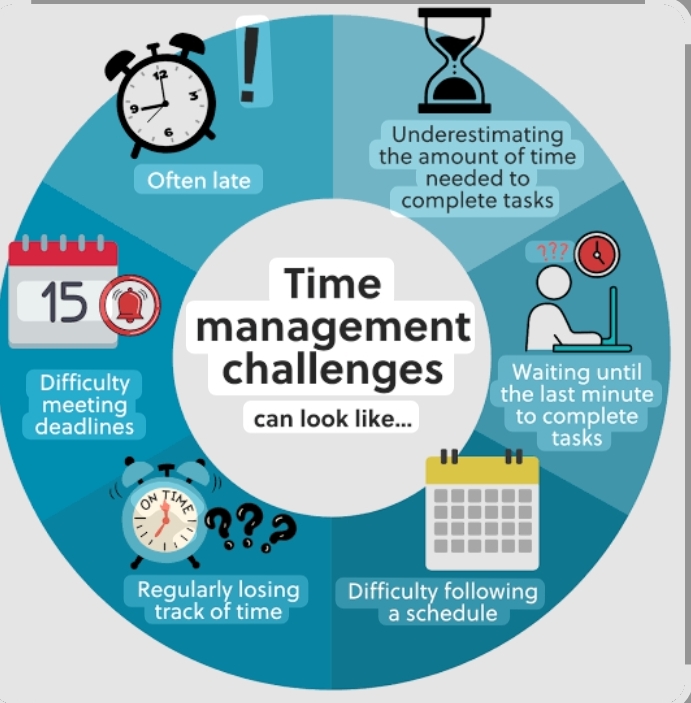
Time Management Tips for Students
Effective time management is a critical skill for students juggling academic responsibilities, extracurricular activities, and personal commitments. Mastering this skill can lead to reduced stress, improved performance, and a healthier work-life balance. This blog provides actionable tips to help students optimize their time and achieve their goals.
Understanding Time Management
Time management is the process of planning and controlling how much time to spend on specific activities. It involves prioritizing tasks, setting realistic goals, and maintaining focus. The benefits of good time management include:
- Increased Productivity: Completing tasks efficiently.
- Reduced Stress: Avoiding last-minute rushes.
- Improved Academic Performance: Allocating time effectively for studies.
- Work-Life Balance: Ensuring time for relaxation and social activities.
Assess Your Current Schedule
Before implementing new strategies, it’s essential to evaluate how you currently spend your time. Use the following steps to analyze your daily routine:
- 1. Track Your Activities: Keep a log of how you spend each hour for a week.
- 2. Identify Time Wasters: Note activities that consume time without adding value, such as excessive social media use.
- 3. Evaluate Your Priorities: Determine which tasks align with your academic and personal goals.
- This self-awareness forms the foundation for better time management.
Set Clear Goals
Having clear objectives provides direction and motivation. Goals should be:
- Specific: Clearly define what you want to achieve.
- Measurable: Quantify your goals for easy tracking.
- Achievable: Set realistic targets considering your capabilities.
- Relevant: Align goals with your long-term aspirations.
- Time-bound: Assign deadlines to each goal.
For instance, instead of saying, “I want to improve in math,” set a goal like, “I will score 90% on my next math test by studying for two hours daily.”
Create a Schedule
A well-organized schedule helps you allocate time effectively. Use tools like planners, calendars, or apps to design a daily or weekly plan. Key tips include:
- Block Time for Priorities: Schedule study sessions, classes, and assignments first.
- Incorporate Breaks: Short breaks improve focus and prevent burnout.
- Be Realistic: Avoid overloading your schedule to maintain flexibility.
Time Blocking Technique
Time blocking involves dedicating specific time slots for different activities. For example:
- 8:00 AM – 9:00 AM: Morning routine
- 9:00 AM – 12:00 PM: Study for exams
- 12:00 PM – 1:00 PM: Lunch break
- 1:00 PM – 3:00 PM: Complete assignments
- 3:00 PM – 4:00 PM: Exercise
This structured approach minimizes procrastination and ensures all tasks are accounted for.
Prioritize Tasks
Not all tasks are equally important. Use the Eisenhower Matrix to categorize tasks based on urgency and importance:
- 1. Urgent and Important: Do these immediately (e.g., submitting an assignment).
- 2. Important but Not Urgent: Schedule these for later (e.g., preparing for an exam).
- 3. Urgent but Not Important: Delegate or minimize these (e.g., attending non-critical meetings).
- 4. Not Urgent and Not Important: Eliminate these (e.g., excessive gaming).
Focusing on high-priority tasks ensures efficient use of your time.
Avoid Procrastination
Procrastination is a common challenge for students. Overcome it with these strategies:
- Break Tasks into Smaller Steps: Tackle large tasks in manageable chunks.
- Set Deadlines: Create a sense of urgency with personal deadlines.
- Use the Pomodoro Technique: Work for 25 minutes, then take a 5-minute break.
- Eliminate Distractions: Study in a quiet environment and turn off notifications.
Consistency in following these techniques builds discipline and reduces procrastination over time.
Utilize Productivity Tools
Leverage technology to stay organized and productive. Popular tools include:
- Todoist: Task management app.
- Google Calendar: Schedule and reminders.
- Notion: Comprehensive planning and note-taking.
- Forest: Focus app to limit phone usage.
Experiment with different tools to find what works best for your needs.
Balance Study and Leisure
While academics are crucial, maintaining a balance between study and leisure is equally important. Here’s how:
- Set Boundaries: Define specific study hours and stick to them.
- Pursue Hobbies: Engage in activities that rejuvenate you.
- Stay Active: Exercise regularly to boost energy levels and focus.
- Socialize: Spend quality time with family and friends to relax and recharge.
This balance prevents burnout and enhances overall well-being.
Seek Support
Don’t hesitate to seek help when needed. Reach out to:
- Teachers: For academic guidance and clarification.
- Peers: Collaborate on assignments and share study tips.
- Family: For emotional support and encouragement.
- Counselors: To develop personalized time management strategies.
Building a support system can make a significant difference in staying on track.
Evaluate and Adjust
Regularly assess your time management strategies and make necessary adjustments. Reflect on:
- What Worked: Identify effective techniques.
- What Didn’t Work: Analyze areas for improvement.
- New Challenges: Adapt to changes in responsibilities or priorities.
Continuous improvement ensures long-term success.
Conclusion
Mastering time management is a journey that requires patience, practice, and persistence. By setting clear goals, creating structured schedules, and maintaining a healthy balance, students can optimize their time and achieve their full potential. Start implementing these tips today to take
control of your academic and personal life.
Your blog on time management tips for students has been drafted. Let me know if you’d like to refine or expand any section!
Leave a Reply